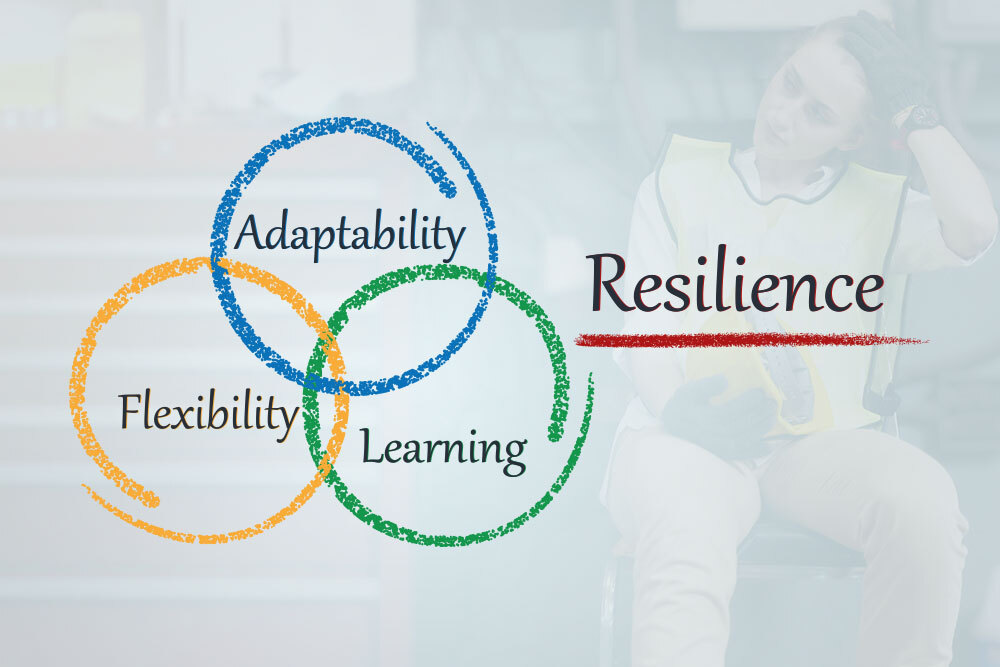
Poor mental health costs.
It costs businesses approximately £56 billion annually in presenteeism, absenteeism and staff turnover.
It costs workers 17 million sick days for work-related stress, anxiety or depression.
And it can cost you professional relationships, opportunities and even your well-being.
Several factors cause poor mental health and they affect everyone differently. What might be an inconvenience for some is a calamity for others – it often comes down to psychological resilience.
Without resilience, stress can have an outsized impact on your self-esteem, job performance and health.
This blog will help you understand why resilience at work is essential and how you can develop it.
What Resilience Means
Resilience is the ability to recover quickly from stressful or difficult times and events.
A common analogy for this is the elastic band. You can put stress on an elastic band – stretch it, twist it, fold it – but it springs back into its original shape afterwards.
You can put stress on a person with psychological resilience too – trauma, challenge, crisis – but they’ll bounce back and quickly return to a healthy mental and emotional state.
But it’s not always easy to bounce back. Stressful or challenging times can trigger negative thinking patterns in some of us. These negative patterns are usually developed over years of habitual thinking and often lead to us experiencing feelings of stress, anxiety or depression.
You might fall into negative thinking patterns more readily if you lack resilience. Even small events can trigger significant mental suffering or feelings of low self-worth when this happens.
What Resilience Doesn’t Mean
Being resilient doesn’t mean you never experience stress, anxiety or challenging thoughts.
Everyone experiences tough times. It’s part of what makes us human, and it’s healthy. That’s why a rubber band is used in the analogy, not a lump of wood.
A rubber band stretches with stress but springs back into shape. A lump of wood just gets slowly chipped away.
There’s another reason why the elastic band analogy works. Put an elastic band under enough stress and it breaks, just like all of us. Please seek professional support if you’re struggling with your mental health and can’t cope. The Samaritans helpline is free to use and open 24/7.
Why is Resilience Important at Work?
Resilience theory is often associated with mental toughness. Mental toughness is the ability to commit to a task and perform in the face of stress, challenge or pressure. This ability is vital to succeeding in sports, education and the workplace.

Professor of Applied Psychology Peter Clough describes mental toughness as the ability to “take whatever comes along in stride.” Being able to do this depends on you feeling confident, committed to a task, in control and up for a challenge. These traits are referred to as the four Cs of mental toughness.
Lacking any of them, particularly confidence, generally leads to underperformance or undue stress at work. And when you’re stressed or plagued by self-doubt, it’s harder to focus, innovate or make decisions. You might even find yourself shying away from opportunities because of a fear of failure.
Psychological resilience is critical to overcome this. You can and should expect employers to manage stress in the workplace as much as reasonably possible. But they can never eliminate it.
During stressful times, resilience will help keep your anxiety or feelings of doubt in check. It prevents you from falling back into negative patterns of thinking again and again.
How to Develop Resilience
We’ve outlined some common challenges you might face if you have low resilience and what you can do to overcome them:
Keep Things in Perspective
Evolving technology and significant global events constantly affect how we live and work. And as frustrating as it is, we can’t change this. You can change how you think about things, however.
Accepting you’re powerless to control everything is helpful. It doesn’t mean giving up hope. Just try and focus your energy on the things you can influence.
It’s much easier said than done, so cutting out news or social media from your life can be helpful. Keeping things in perspective can be a lot easier if you’re not constantly bombarded by sensationalist journalism or forced to compare yourself to your most successful acquaintances.
Think of Positive Outcomes
Humans are hard-wired to think of the worst-case scenario – it’s a survival instinct.
But this trait means we often fall into irrational thoughts and catastrophise.
When you lack resilience, you’ll find yourself arriving at these awful scenarios much more quickly and more often.
Reminding yourself of your good qualities and past achievements can help counteract this. Actively tell yourself you can succeed and picture the best-case scenario. It takes determination. You might find it uncomfortable to try at first but keep at it. Consistent effort is the only way to change habits.
Thinking like this is an example of cognitive behaviour therapy (CBT) – a method of managing your mental health problems by changing your thoughts.
Prepare to Fail
Teachers have known about the importance of resilience for years. That’s why they cultivate environments where children accept mistakes as a critical part of learning and value effort over outcome. Unfortunately, this attitude is rarely shared by adults and managers.
But don’t let a lack of resilience prevent you from trying new things.
Fear of failure and the psychological harm it can inflict, is powerful. So, you need to reframe these feelings and become your favourite primary school teacher. Praise your efforts! Don’t get frustrated by a lack of immediate success when trying something new. Go back to your CBT toolkit and focus on your progress, no matter how incremental.
And employers should appreciate that new skills take time to develop. Encourage an environment where feedback is positive. Otherwise, you risk stifling innovation in your workplace and staff will avoid taking on additional responsibilities.
Be Open to Collaboration
Collaboration is rightly encouraged by most employers but workplace relationships are often the greatest test of resilience. The worry of interacting with others and sharing your ideas can often trigger negative thought patterns.
You might doubt your own abilities when your contributions aren’t immediately praised or adopted.
In a misguided attempt at self-preservation, you might even avoid collaboration entirely.
Trying to go it alone will only make you feel more overwhelmed and stressed. You’ll miss out on the support and guidance that comes from working with colleagues. People rarely remember your mistakes and almost always want you to succeed. Besides, we’re probably too obsessed with our own mistakes to notice yours.
Is it Possible to Train Resilience?
Yes. But it isn’t easy.
With training, people can overcome negative thinking patterns and develop psychological resilience. The trick is doing it consciously and consistently.
There are several training courses to support good mental health. Our Resilience Training course helps you understand and identify the negative thinking patterns that might be holding you back.
By following the training, you’ll learn various strategies that support your physical and mental health, including CBT and mindfulness techniques. You’ll develop resilience and new, better ways of thinking, leading to a more confident, productive and healthier you.
About the author(s)
























































































































































































































































































































































































































































































